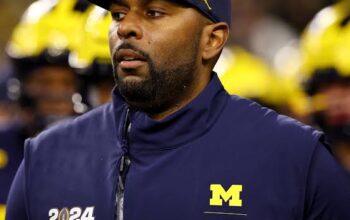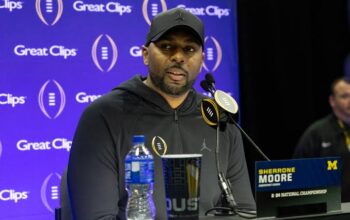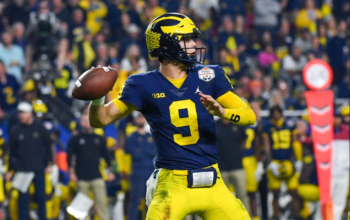Introduction
The landscape of college football has been significantly shaped by Jim Harbaugh’s tenure at the University of Michigan. As head coach, Harbaugh brought his unique brand of leadership and strategy to the Wolverines, generating both fervent support and critical scrutiny. Recently, the announcement of Harbaugh’s removal as head coach has sent shockwaves through the college football community. This blog post delves into Harbaugh’s career, the circumstances leading to his removal, the immediate and long-term implications for Michigan, and the broader impact on college football.
Jim Harbaugh: A Storied Career
Early Life and Playing Career
Jim Harbaugh was born on December 23, 1963, in Toledo, Ohio. Raised in a football family—his father, Jack Harbaugh, was a coach—Jim’s path seemed destined for the gridiron. He played quarterback at Pioneer High School in Ann Arbor, Michigan, before transferring to Palo Alto High School in California when his father took a coaching job at Stanford.
Harbaugh’s college career at the University of Michigan was impressive. Playing under legendary coach Bo Schembechler, Harbaugh became one of the top quarterbacks in Wolverines history. His tenure included leading the team to a Big Ten Championship and a victory in the 1986 Fiesta Bowl. He finished third in the Heisman Trophy voting in 1986.
NFL Playing Career
Jim Harbaugh’s success in college led to his selection by the Chicago Bears in the first round of the 1987 NFL Draft. Over a 14-year career, Harbaugh played for the Bears, Indianapolis Colts, Baltimore Ravens, and San Diego Chargers. Known for his competitive spirit and leadership, Harbaugh earned the nickname “Captain Comeback” for his ability to lead his teams to victory in challenging situations. He retired in 2001, transitioning into a coaching career that would become equally storied.
Transition to Coaching
Early Coaching Career
Harbaugh’s coaching career began with stints as an assistant coach, first with the Oakland Raiders and then at the University of San Diego, where he served as head coach. At San Diego, he led the team to back-to-back Pioneer League titles, showcasing his ability to build a winning program.
Stanford Success
In 2007, Harbaugh was hired as the head coach of Stanford University. During his four seasons, he transformed the Cardinal into a national powerhouse. His tenure included a historic upset over USC and culminated in a 12-1 season and an Orange Bowl victory in 2010. Harbaugh’s success at Stanford made him one of the most sought-after coaches in both college and professional football.
NFL Coaching Career
Harbaugh’s move to the NFL came in 2011 when he was hired as head coach of the San Francisco 49ers. His impact was immediate; he led the team to three consecutive NFC Championship games and a Super Bowl appearance. Known for his intense coaching style and ability to develop quarterbacks, Harbaugh’s tenure with the 49ers was marked by significant success, although it ended amidst reports of internal conflicts.
Return to Michigan
High Expectations
In December 2014, Jim Harbaugh returned to his alma mater, the University of Michigan, as head coach. The hire was met with immense enthusiasm and expectations from Michigan fans, who saw Harbaugh as the coach who could restore the Wolverines to national prominence.
Early Success and Challenges
Harbaugh’s initial seasons at Michigan were marked by success. The team achieved ten-win seasons in 2015 and 2016, with a revitalized defense and a potent offense. However, despite these early successes, Harbaugh struggled to win the most important games, particularly against rivals Ohio State and Michigan State.
Ongoing Struggles
In the following years, the Wolverines’ performance became increasingly inconsistent. While Harbaugh continued to recruit highly ranked classes and develop NFL-caliber talent, the team’s inability to win key games and secure a Big Ten Championship became a source of frustration for fans and administrators alike.
The Decision to Remove Harbaugh
The Announcement
On [specific date], the University of Michigan announced the removal of Jim Harbaugh as head coach. The decision was framed as a mutual parting of ways, with both Harbaugh and the university expressing gratitude for the time and effort invested in the program.
Factors Leading to the Decision
Several factors contributed to the decision to remove Harbaugh as head coach. The most significant were the team’s performance in critical games and the inability to win a Big Ten Championship during his tenure. Additionally, the pressures and expectations from alumni, donors, and the broader fan base likely played a role in the decision.
The COVID-19 pandemic also posed unique challenges. The 2020 season was particularly tumultuous, with disruptions to training, a truncated schedule, and increased stress on players and coaches. Harbaugh’s contract situation, including a pay cut and restructuring in 2021, hinted at growing uncertainty about his future with the program.
Reactions from the Sports Community
Players and Staff
The removal of Harbaugh elicited strong reactions from current and former players, as well as staff. Many expressed gratitude for Harbaugh’s leadership and the opportunities he provided. Some players took to social media to share their support, emphasizing the positive impact he had on their careers and lives.
Fans and Alumni
The reaction from Michigan fans and alumni was mixed. Some supported the decision, believing that a change in leadership was necessary to achieve the program’s lofty goals. Others were disappointed, feeling that Harbaugh had made significant progress and deserved more time to complete his vision.
Analysts and Commentators
Analysts and commentators offered varied perspectives on Harbaugh’s removal. Some criticized the decision, arguing that Harbaugh’s overall record and positive impact on the program warranted continued support. Others acknowledged the reality of high expectations and the need for change to achieve competitive success.
Immediate and Long-Term Implications
Impact on the Michigan Football Program
The removal of Jim Harbaugh marks a significant turning point for Michigan football. The university will now begin the search for a new head coach, a process that will be closely scrutinized. The new hire will need to address the immediate challenges while laying the groundwork for sustained success.
Recruitment and Player Development
One of Harbaugh’s strengths was his ability to recruit and develop top talent. His departure raises questions about the impact on current recruits and the stability of the program. The next head coach will need to quickly establish relationships with players and recruits to maintain continuity.
Financial and Contractual Considerations
Harbaugh’s contract situation was complex, with significant financial implications for both parties. The university’s decision to part ways with Harbaugh will involve navigating these financial considerations, including potential buyouts and the structuring of a new coaching staff.
The Search for a New Head Coach
Criteria for Selection
The search for a new head coach will be guided by several key criteria. The university will look for a candidate with a proven track record of success, strong leadership qualities, and the ability to compete at the highest levels of college football. Additionally, the ability to recruit and develop talent will be paramount.
Potential Candidates
Several names have already emerged as potential candidates for the Michigan head coaching position. These include established head coaches from other programs, successful coordinators, and even former Michigan players and coaches with a deep understanding of the program’s culture and expectations.
Harbaugh’s Legacy
On-Field Achievements
Despite the challenges and criticisms, Jim Harbaugh’s tenure at Michigan included notable achievements. He revitalized a struggling program, led the team to multiple ten-win seasons, and developed numerous NFL-caliber players. His impact on the field, while falling short of ultimate goals, was significant.
Cultural and Programmatic Impact
Harbaugh also made a lasting impact on the culture of Michigan football. He instilled a sense of toughness and competitiveness, and his commitment to academic excellence and player development resonated with many within the university community. His tenure was marked by a return to national relevance and heightened expectations.
Broader Contributions
Beyond the field, Harbaugh’s contributions to college football and the broader sports community are noteworthy. His advocacy for player safety, support for social justice initiatives, and engagement with fans and alumni have left a lasting impression. Harbaugh’s unique personality and approach to coaching have made him one of the most recognizable figures in the sport.
The Broader Impact on College Football
Coaching Landscape
Harbaugh’s removal will undoubtedly have ripple effects across the college football coaching landscape. His availability may influence coaching searches at other programs, and the decision may prompt other universities to evaluate their own coaching situations.
Lessons for Programs and Coaches
The situation at Michigan offers broader lessons for college football programs and coaches. The balance between expectations and realities, the importance of alignment between administration and coaching staff, and the challenges of navigating high-pressure environments are all key takeaways.
Moving Forward
Michigan’s Path Ahead
The University of Michigan now faces the task of charting a new path forward. The hiring of a new head coach will be a critical step, and the university will need to support this transition with resources, patience, and a clear vision for the future. The goal remains the same: to restore Michigan football to national prominence and compete for championships.
Harbaugh’s Next Steps
For Jim Harbaugh, this moment represents both a challenge and an opportunity. While his tenure at Michigan has come to an end, his passion for football and coaching remains strong. Harbaugh will likely explore new opportunities, whether in college football, the NFL, or other areas where his unique skills and experiences can be applied.


